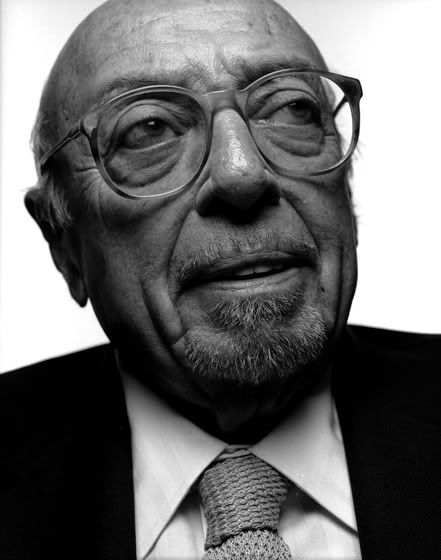
Ahmet Ertegün, 31st July 1923 – 14th December 2006
Ahmet Ertegün, who along with Herb Abramson founded Atlantic Records, died this week.
"Ahmet Ertegün was injured after a fall at a Rolling Stones performance on October 29, 2006. Ertegun, 83, slipped and hit his head backstage while the band were playing at former US President Bill Clinton's 60th birthday party in New York Sunday 29 October 2006. After being in a positive stable situation, he slipped into a coma and died with his family by his side on December 14, 2006 at New York Presbyterian Hospital-Weill Cornell Medical Center. He will be buried in his native Turkey, and a memorial service will be held in New York in the New Year, an Atlantic Records spokesman said."
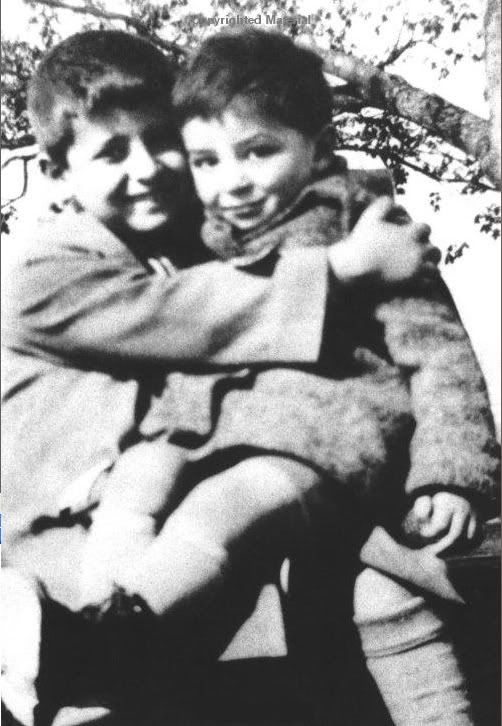
It was a tragic end to the life of a man who from the age of five had dreamed of being a part of the jazz and blues world he was introduced to by his elder brother Nesuhi, listening to records snuck into their bedroom into the early hours at the Turkish Embassy in Washington D.C. The Ertegun family name means 'living in a hopeful future', and Ahmet and Nesuhi's went out to live theirs as soon as they could, going out to see the great names of jazz; walking from door to door in the black neighbourhoods of Washington asking around to buy old records; and getting to befriend some of those same artists they had worshipped - Duke Ellington, Lena Horne and Jelly Roll Morton, J.C. Higginbotham and Pete Johnson.
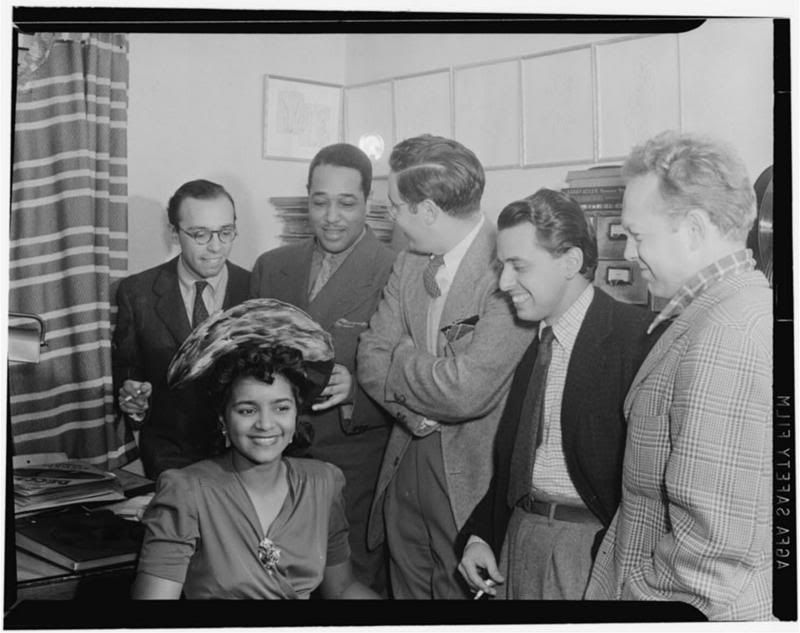
It wasn't just about music. From the moment he heard jazz as a boy in London in the early 30s, Ahmet felt an affinity with black Americans. He was shocked by the treatment they had to contend with in their own country, and felt something similar in a Europe where their muslim faith set Turks apart despite their modernising new government:
"As I grew up, I began to discover a little bit about the situation of black people in America, and experienced an immediate empathy with the victims of such senseless discrimination. Because although the Turks were never slaves, they were regarded as enemies within Europe because of their Muslim beliefs."
The hopeful future would in Ahmet's dreams include understanding and co-operation between races. As a boy, Ahmet gravitated towards the embassy's black janitor, Cleo Payne, who became a mentor to him, taking him on trips around the black neighbourhoods of Washington and Georgetown, and introducing him to the local musicians, who would then come to play at Ahmet's parties at the embassy.

Nesuhi and Ahmet decided to put on the first ever integrated concert in Washington D.C., the nation's capital being a segregated Jim Crow town back in those years. The Jewish Community Center was the only place that would allow both a mixed audience and mixed band. Later they would be allowed to use the National Press Club's auditorium for other shows.
In 1946 Ahmet became friends with Herb Abramson, a dental student and A&R man for National Records. Deciding to start a label together they talked Max Silverstein into backing them. There was to be two labels Jubilee for Gospel and Quality for jazz and R&B. When things didn't start off well, Silverstein got out, and the two were left to raise some more cash to start a new label, Atlantic Records in the autumn of 1947, working out of a condemned Jefferson Hotel on Fifty-Six between Sixth and Broadway. Sleeping in the bedroom the living room was used as a office, and the office was used as a recording studio through the night. In order to help with the rent Ahmet rented a bed to his cousin Sadi Koylan a poet. With an upcoming recording strike declared by Caesar Petrillo to commence January 1, 1948 they began recording as much material as possible. The first sides were recorded November 21, 1947 by the Harlemaires with The Rose of the Rio Grande. By the end of December a total of sixty-five songs had been recorded.
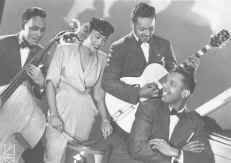
The early recordings, well-written and sophisticated, didn't sell, and searching for inspiration, Ahmet and Herb travelled south to listen to what people were dancing to. The missing ingredient was the danceable rhythm, and with that added to the mix, Atlantic had their first hit with Sticks McGhee's Wine Spo-Dee-O-Dee, an Army drinking song with ribald lyrics heavily toned-down for the pop market. It would not be the last time that Ahmet and Atlantic would be willing to seek out and pick up new inspirations and new ideas, particularly from the South, in their quest for great music. It was one of the qualities that put Ahmet Ertegun apart from other record executives of the time, who relied upon talent scouts and A&R men to do the searching. Ahmet was involved with his artists, and loved the music they made:
"From the moment an artist walks through the door at Atlantic, they are already a star to us."
In r&b, Ahmet would sign up and treat like stars such talents as Professor Longhair, The Clovers, Big Joe Turner, LaVern Baker, Ruth Brown, Clyde McPhatter, The Drifters, Ray Charles, Sam & Dave, Aretha Franklin. Later, he would pioneer the move into rock music that allowed the label to offer itself up for sale in the late 60s and guaranteed its continued survival as an imprint. Ironically that change allowed for the continued support of r&b acts and rerelease of the Atlantic r&b catalogues.
To be fair to the whole man, Ahmet was of course a businessman as well as a music lover. Over the years, several artists would have differences with Ahmet and Atlantic over the business of music, and the payment of royalties. Fred Wilhelms, lawyer involved in royalties work for artists such as LaVern Baker, had this to say this week:
"I had a much harder time than most people reconciling what Ahmet Ertegun accomplished with what he knew was being done to artists with his full complicity."
Unlike some other outfits such as King Records, Atlantic had in fact paid music publishing royalties and also royalties to their performers from the start, but while the contracts were considered standard for the time, as the popularity of the music grew, the deals began to appear less than generous. When disagreements emerged over accounting and collection of royalties due, splits occured, Ruth Brown, Ray Charles and LaVern Baker amongst the well-known. To his credit, in recent years Ahmet and the other old executives of Atlantic were amongst those willing to contribute to the foundation of the Rhythm & Blues Foundation, and other artist benevolent funds, as well as reconciling several outstanding royalties disputes out of their own fortunes.
Now the adventure in search of "cowboys, indians, beautiful brown-skinned women and jazz" , which Ahmet dreamed of as a nine-year old boy collecting and treasuring old 78s has ended with his return to rest in his native Turkey. Ahmet once explained it all, in a slightly tongue in cheek way:
"If it hadn't been for the fall of the Ottoman Empire ..."
I certainly had never really considered the contribution of Mustafa Kemal Ataturk to the spread of black American music into the homes of all Americans and on across the Atlantic into the consciousness of the whole world, but it is impossible to forget the part that Ahmet and his brother Nesuhi played in that. Ahmet and Nesuhi didn't treat r&b as 'race music' in the way so many others had done previously, but as music at the forefront of creativity and genius. Quincy Jones made a similar comment in one of many tributes in the press this week:
"[Ahmet was] one of the pioneering visionaries in this whole scene. He was a very 360-degree person. He loved to have a good time. He knew how to party, which is my kind of guy, and he knew how to work. He knew how to look into the future and how to execute to bring it to fruition.”
The music Ahmet brought to the world made us think about living in a more hopeful future.
To read about Ahmet's life and Atlantic Records in his own words, read What'd I Say: 50 Years of Atlantic Records, from which much of the information and quotes here are to be found. Another good read is the biography Music Man. Fred Wilhelms article at CounterPunch offers another interesting perspective on Ahmet.

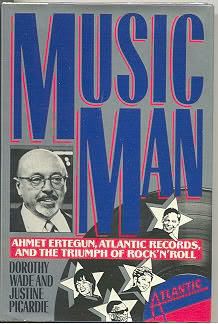






No comments:
Post a Comment